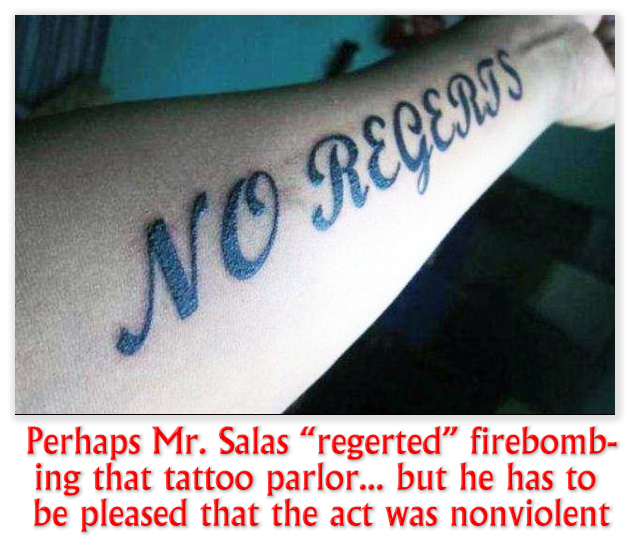We post news and comment on federal criminal justice issues, focused primarily on trial and post-conviction matters, legislative initiatives, and sentencing issues.
10th CIRCUIT SAYS DIMAYA MEANS 924(c) RESIDUAL CLAUSE IS UNCONSTITUTIONAL
 Cliff Salas was convicted of conspiracy to commit arson under 18 USC 844 for using a Molotov cocktail to firebomb a tattoo parlor, which came with an add-on 30-year sentence for using a destructive device in a crime of violence.
Cliff Salas was convicted of conspiracy to commit arson under 18 USC 844 for using a Molotov cocktail to firebomb a tattoo parlor, which came with an add-on 30-year sentence for using a destructive device in a crime of violence.
Under 18 USC 924(c), a defendant who uses or possesses a firearm or destructive device in a drug trafficking offense or crime of violence receives a mandatory consecutive sentence of from five years to life, depending on the type of gun or device, on whether it’s a first 924(c) offense or subsequent offense, and on how the weapon was used. A “crime of violence” is defined as either (1) an offense that has as an element the threatened use or actual use of physical force against a person or property; or (3) an offense that presents a significant risk of physical harm to people or property.
Because an 18 USC 844 arson conviction is too broad for generic arson, the enumerated clause of 18 USC 924(c) does not encompass Sec. 844 arson. Likewise, the elements clause, which requires use of force against the property of another, does not encompass Sec. 844 arson, because the property burned up may be one’s own. That meant that that arson must come under the 924(c) residual clause.
 Two weeks ago, the 10th Circuit hurled its own Molotov cocktail at the 924(c) residual clause, striking it as unconstitutional under the 5th Amendment. The Court concluded that the Supreme Court’s recent Dimaya decision required that the 924(c) residual clause be declared too vague. “Ultimately,” the Court said, “Sec. 924(c)(3)(B) possesses the same features as the ACCA’s residual clause and Sec. 16(b) that combine to produce ‘more unpredictability and arbitrariness than the Due Process Clause tolerates,’ and Dimaya’s reasoning for invalidating Sec. 16(b) applies equally to Sec. 924(c)(3)(B). Sec. 924(c)(3)(B) is likewise unconstitutionally vague.”
Two weeks ago, the 10th Circuit hurled its own Molotov cocktail at the 924(c) residual clause, striking it as unconstitutional under the 5th Amendment. The Court concluded that the Supreme Court’s recent Dimaya decision required that the 924(c) residual clause be declared too vague. “Ultimately,” the Court said, “Sec. 924(c)(3)(B) possesses the same features as the ACCA’s residual clause and Sec. 16(b) that combine to produce ‘more unpredictability and arbitrariness than the Due Process Clause tolerates,’ and Dimaya’s reasoning for invalidating Sec. 16(b) applies equally to Sec. 924(c)(3)(B). Sec. 924(c)(3)(B) is likewise unconstitutionally vague.”
Currently, only the 6th Circuit holds that Sec. 16(b) is unconstitutional while 924(c)(3)(B) is not.
United States v. Salas, Case No. 16-2170 (10th Cir. May 4, 2018).
– Thomas L. Root

